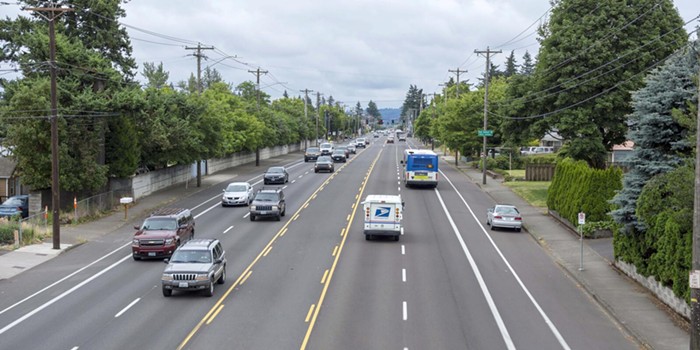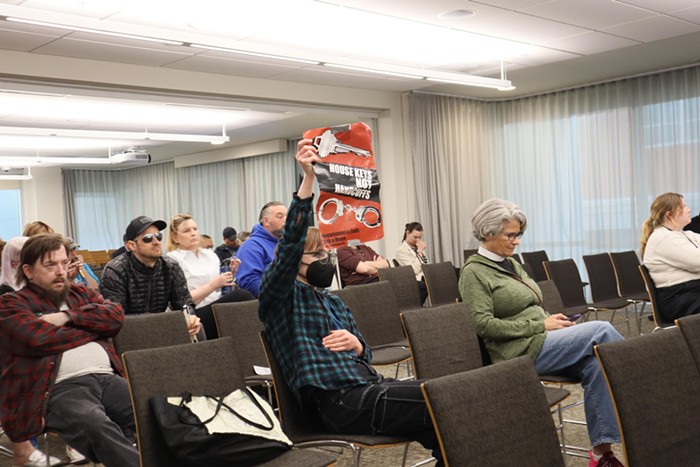Oil transport company Zenith Energy spent time courting Portland elected officials in 2022, hoping they would approve a Land Use Compatibility Statement (LUCS) allowing the company to continue its operations in the city. While Zenith's efforts were successful—the Portland Bureau of Development Services (BDS) approved the LUCS in 2022 after an initial denial the year prior—the company violated city lobbying rules in the process, according to the Portland Elections Office.
In a March 26 warning letter to Zenith, Portland Auditor Simone Rede wrote the company violated city code requiring organizations that spend more than eight hours or $1,000 lobbying city officials in any quarter to report the activity.
According to the Elections Office, which is part of the City Auditor's Office, Zenith Energy lobbied city officials for more than eight hours during the third quarter of 2022. The company "facilitated a site tour and engaged in several meetings with City officials to gain good will and advance approval of its permit," but it failed to "register or report those hours."
The company will not face financial repercussions for the code violation, but Portland climate activists—who have long raised concerns about Zenith’s operations in the city and the company’s relationship with city officials—hope the finding will persuade county and state leaders to hold Zenith accountable.
The Portland Elections Office, housed in the Auditor's Office, began investigating Zenith's lobbying activities last fall after a complainant raised concerns about potential code violations. The complainant was Nick Caleb, a climate and energy attorney at Breach Collective, and a vocal opponent of Zenith’s operations in Portland.
According to Caleb’s complaint, and subsequently confirmed by the Elections Office’s investigation, Zenith Energy staff spent the third quarter of 2022 in frequent communication with city employees and elected officials—beyond the eight hour limit. The investigation concludes that given the communication during this time, which included a Zenith site tour with Commissioners Dan Ryan and Carmen Rubio (who oversaw BDS and the Bureau of Planning and Sustainability at the time) corresponding in meetings and via email, phone call, and text, the company spent between 8.75 and 20 hours lobbying.
The third quarter of 2022 is also when Zenith had the most to gain from engaging with city officials. BDS had previously denied Zenith’s LUCS application on the grounds that their permit didn’t align with city climate goals. With its business threatened, Zenith began a legal challenge against the city of Portland, and submitted a new LUCS application. In the new application, the company said it planned to begin solely transporting renewable fuels within five years, assuaging city officials’ climate concerns.
"According to Zenith themselves, the tour was meant to correct misinformation from bad press," the letter to Zenith states. "It is more likely than not that Zenith wanted to convince City officials the terminal was a positive endeavor and that plans were moving in the right direction to gain approval for a new LUCS. We conclude that Zenith's application for the LUCS...was a primary factor in their communications with the City during the third quarter of 2022."
In a statement, City Auditor Simone Rede said "Portlanders can thank the complainant for raising their concern to the City Elections Office. The public deserves to know who is trying to influence City decisions. That’s why lobbyist registration and reporting requirements exist."
Despite the findings of impropriety, Zenith won't face a financial repercussion for its lobbying code violations. The warning letter states that, given Zenith's clean prior record and the company's cooperation during the city's investigation—as well as a "low level of lobbying during the violating quarter"—auditors merely recommend the company participate in lobbying regulation training in the case of future communications with the city.
Caleb, the complainant, told the Mercury despite the insubstantial penalties for Zenith, "the auditor's action is still significant in the overall effort to stop Zenith's activities." Caleb said the investigation "gave additional credibility to what advocates have been saying to state regulators: That city officials did not conduct a normal, run-of-the-mill process for Zenith's LUCS in 2022."
Caleb's concerns—which are shared by many other environmental advocates who have protested Zenith's operations in Portland—run deeper than the company's lobbying violations. Zenith Energy opponents say the company's crude oil transport services could be disastrous to the environment in the case of an earthquake, contribute to poor air quality in the city, and promote the continued use of fossil fuels—and they say the responsibility for the company's continued operations should also rest at the feet of city leaders.
"In 2022, officials at the City of Portland, including Commissions Carmen Rubio and Dan Ryan, plotted behind closed doors with Zenith to rush new permissions to allow the oil company to continue running oil trains through Portland neighborhoods," Caleb told the Mercury. "I'm glad the auditor is holding Zenith accountable for its part, and now we need state regulators to hold city officials accountable as well."




















